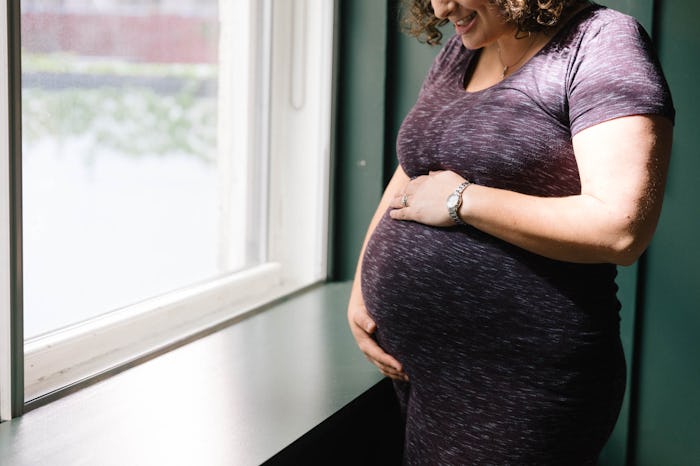Life
This Is What It Feels Like When Your Belly Drops, According To An Expert
Ah, those final weeks of pregnancy. If you thought the first trimester was hard, with its extreme fatigue and nausea, you may now believe the third trimester is even harder. At least you could sleep in the beginning. Now you're waking up every hour to pee, and no matter how many positions or pillows you try, you can't get comfortable. After about week 36 in both of my pregnancies, when the midwife said it was safe for the baby to be born anytime, I started obsessing over signs of labor, like wondering what it feels like when your belly drops. Your belly dropping is one of the most common signs to look for, though it's not necessarily a green light that labor will start the next day. Romper spoke with Dr. G. Thomas Ruiz of Orange Coast Memorial Medical Center in Fountain Valley, California about the two main clues your belly has dropped.
Around week 36 of pregnancy, according to Ruiz and WebMD, your baby will descend into your pelvis. This move is commonly referred to as "dropping," but may also be called "lightening" or "engagement." The popular pediatrician and author Dr. Sears noted on his website that dropping is usually most noticeable in first-time moms, as subsequent deliveries may not require as much of a warm-up from the pelvic muscles. If you're having your second baby, you may not experience dropping until the onset of labor.
Over email, Ruiz tells Romper that "many women can tell when their fetus drops." The first clue, he explains, is feeling your baby's head deep in your pelvis. According to Ruiz, this may cause more frequent urination and pelvic aches and pains, especially while standing. On the bright side, there is now less pressure on your upper body, which could provide some relief from heartburn and that out-of-breath feeling pregnant women typically have.
The second clue that your belly has dropped is visual, says Ruiz. When you look at your belly in the mirror, you'll probably notice that "the position of the pregnant uterus is not as high in the upper abdomen." Friends and family will probably chime in, too, when they notice you're carrying lower. Everyone loves to guess when baby will finally come.
Even after your belly, drops you may still have a few weeks to go before the big event. After all, 40 weeks is full term and many babies come late. But you can rest assured you're in the home stretch when you feel your belly drop. It's like nature's way of saying, hang in there, this will all be over soon.
